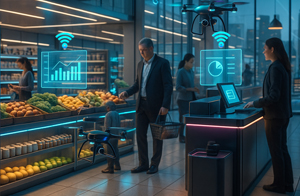Forward-looking manufacturers are embracing Industry 4.0 as a strategic shift, not merely a tech upgrade, as it drives resilience, speed, and competitive edge.
In an era defined by disruption, reinvention has become the only constant. For the global manufacturing sector, Industry 4.0 is not merely a set of technologies—it is a systemic evolution. One that redefines how we engineer, operate, and deliver. What began as a convergence of cyber-physical systems is now a strategic imperative, altering the DNA of manufacturing at every level—from shop floors to boardrooms.
According to Forbes*, 85% of manufacturing leaders believe the technologies they adopt today will be the primary driver of competitiveness over the next five years, underscoring a clear executive consensus: Industry 4.0 is not just an operational enabler, but a strategic differentiator. For today’s CXOs, the question is no longer whether to embrace Industry 4.0—but how to scale it with governance, resilience, and sustained ROI.
Beyond Automation: The Strategic Shift to Intelligent Systems
Industry 4.0 represents a shift from linear production models to interconnected, adaptive systems. It is a move from automation to autonomy—where machines do not just execute tasks, but sense, learn, and respond. Where systems are no longer siloed but synchronized across the value chain.
At its core lies the convergence of IoT, AI/ML, cloud, and edge computing—creating a digital thread that links engineering, manufacturing, and after-sales. When integrated with manufacturing execution systems (MES), ERP platforms, and digital PLM environments, these technologies offer manufacturers a responsive, data-intelligent backbone that can adapt to volatility, optimize resources, and shorten decision cycles.
This transformation isn’t just technical—it’s operational, cultural, and economic. For leaders steering transformation agendas, Industry 4.0 provides a lens to reimagine enterprise architecture—shifting from fragmented execution to unified intelligence.
Smart Factories: Creating the Blueprint for Agility
McKinsey** observes that smart-factory initiatives can yield 30–50% reductions in machine downtime, 10–30% throughput increases, and up to 85% improvements in forecasting accuracy.
Smart factories are the visible proof of Industry 4.0’s promise. These aren’t factories of the future—they are operational today. Within them, sensors provide real-time visibility into equipment health and process efficiency. MES platforms serve as the digital bridge between planning and execution. Cloud connectivity ensures continuous collaboration across distributed teams.
But what makes these environments truly “smart” is not technology alone—it is the architecture of agility. With hyperautomation reducing manual dependencies and AI in manufacturing floor predicting and adjusting workflows in real-time, manufacturers are now able to shift production lines, adapt to demand signals, and maintain quality—all without operational downtime.
For manufacturing executives, this level of agility is no longer a tactical advantage—it’s a strategic necessity, especially as global supply chains face new demands: local sourcing, just-in-sequence delivery, and mass customization. But agility on the factory floor must be matched by resilience across the supply chain.
AI-Powered Supply Chain Resilience
As trade dynamics shift and tariffs redefine sourcing strategies, manufacturers require more than just visibility—they need foresight. Today’s AI-powered supply chain models empower dynamic risk assessment by processing real-time data across logistics, pricing, and evolving policy landscapes.
When integrated with digital twins and MES platforms, this intelligence becomes actionable—enabling manufacturers to proactively adjust inventory levels, reroute shipments, and stabilize operations before disruptions ripple across the value chain.
From Data to Foresight: The Power of Digital Twins
One of the most transformative tools in this landscape is the digital twin—virtual replicas that mirror the behavior of physical assets, systems, and even entire production lines.
Unlike traditional simulations, digital twins evolve in real time. They ingest data, simulate outcomes, and generate insights that help manufacturers not just monitor but predict. From maintenance schedules to energy consumption, from quality deviations to design flaws—digital twins shift the paradigm from hindsight to foresight.
When combined with advanced analytics and domain-specific AI models, manufacturers gain the ability to test “what-if” scenarios before they impact the floor—ensuring better decisions, lower risks, and greater product integrity.
For COOs and plant leaders, this is a game-changer: it transforms operational uncertainty into proactive control.
Sustainability by Design: The Circular Mandate
Today’s manufacturers are under increasing pressure to deliver not just profit, but purpose. Industry 4.0 solutions enable sustainable operations not as a separate initiative, but as an embedded outcome.
With real-time data on energy usage, material flows, and emissions, manufacturers can actively monitor their environmental footprint. Integrated digital platforms make it possible to track materials across their lifecycle—supporting reuse, remanufacturing, and recycling. Predictive models can even optimize production schedules to minimize waste and reduce overutilization of energy-intensive equipment.
Sustainability, when powered by intelligence, becomes a lever for executive accountability, brand equity, and long-term value creation—not just compliance.
Automotive Manufacturing: Driving the Next Revolution
Few sectors exemplify the transformative potential of Industry 4.0 as distinctly as automotive industry.
Modern automotive manufacturing is now defined by complexity: shortened model lifecycles, electrification, software-defined vehicles, and rising customer personalization. In this dynamic context, the ability to design, build, and service vehicles with speed and precision has become paramount.
Flexible assembly lines equipped with collaborative robots enable rapid transitions between models. Edge AI and computer vision enhance quality checks at micron-level precision. Real-time supply chain visibility—often powered by digital twins—allows for proactive response to global disruptions.
Even post-production, connected vehicles create new aftermarket opportunities. Predictive maintenance, OTA (over-the-air) updates, and data monetization models are transforming how OEMs engage with customers—turning every vehicle into a rolling data center.
At HTC Global Services, we partner with automotive manufacturers to architect these intelligent, software-led ecosystems—through smart factory enablement, advanced analytics, and connected mobility platforms.
The Integration Challenge: Skills, Security, and Scale
While the potential is undeniable, so are the challenges. Many manufacturers still operate with fragmented systems, legacy infrastructure, and limited data visibility. Scaling Industry 4.0 requires more than deploying tools—it demands a rethinking of architecture, processes, and talent.
Workforce readiness remains a core bottleneck. As roles evolve from operators to analysts, reskilling becomes non-negotiable. Equally critical is cybersecurity—every new endpoint and cloud connection expands the attack surface. And then comes the orchestration: integrating modern digital layers over decades-old systems without disrupting business continuity.
This is where digital maturity frameworks and accelerators—like HTC MAiGE platform—play a vital role. They provide blueprints for structured modernization, while enabling enterprises to scale responsibly, securely, and efficiently.
Conclusion: Manufacturing for What’s Next
Industry 4.0 is not a destination. It is an ongoing capability—a new operating system for modern manufacturing. One that is data-driven, insight-powered, and continuously optimized.
For manufacturers, the imperative is clear: evolve or risk obsolescence. But this evolution is not simply about technology—it’s about creating intelligent enterprises that are resilient by design and responsive by default.
At HTC Global Services, we help manufacturers—across discrete and process industries—rethink what’s possible. Through deep domain expertise, scalable platforms, and tailored transformation strategies, we enable enterprises to lead with confidence in an era where change is the only constant.
To those shaping the future of manufacturing: the time to scale smart is now.





